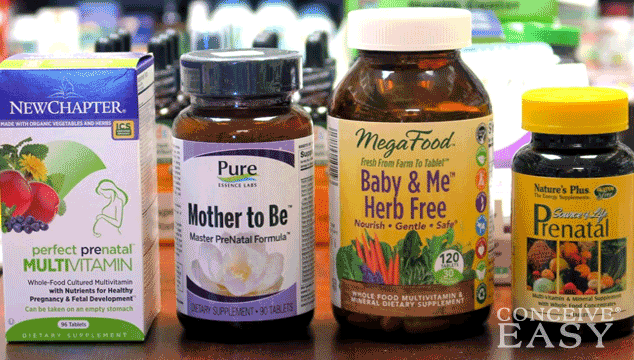![]() The information provided by our expert should not constitute a diagnosis of your condition. Always consult a medical practitioner or healthcare provider for a formal diagnosis. By making use of this content, you agree that ConceiveEasy and the expert assume no liability.
The information provided by our expert should not constitute a diagnosis of your condition. Always consult a medical practitioner or healthcare provider for a formal diagnosis. By making use of this content, you agree that ConceiveEasy and the expert assume no liability.

Prenatal vitamins are special vitamins that are formulated for pregnant women, that contain all of the vitamins and nutrients that a pregnant woman’s body requires. Most people do not realize that prenatal vitamins can actually be beneficial to women who are trying to conceive as well. It can be very difficult to get all of the needed vitamins and minerals from just food sources, even if a woman eats a very healthy diet. That’s why a prenatal vitamin is important to bridge any nutritional gaps that might exist. Claim Your 20 Free Pregnancy Tests – Click Here
Many women do not understand how prenatal vitamins differ from regular adult multivitamins. They might think that they are the same and that they can just use their regular multivitamin as a prenatal vitamin, but that is not the case. Prenatal vitamins contain more iron than regular vitamins. This is because Iron supports the baby’s growth and development. Iron also helps prevent anemia, a condition in which blood lacks adequate healthy red blood cells.
Prenatal vitamins also contain more folic acid than regular vitamins. Folic acid helps prevent neural tube defects. These defects are serious abnormalities of the brain and spinal cord. These are a few of the reasons that it is important to use a prenatal vitamin when you are pregnant or trying to conceive, as opposed to just a regular everyday multi vitamin.

It can be very difficult for women to choose a prenatal vitamin since there are so many different types on the market today. However, there are some standards that doctors have set up to help women choose a good prenatal vitamin that contains all of the needed things. These standards have been set up by doctors and other medical professionals.
Doctors recommend that women look for a prenatal vitamin that contains 400 to 800 micrograms of folic acid, 250 milligrams of calcium, 30 milligrams of iron, 50 milligrams of Vitamin C, 15 milligrams of zinc, 2 milligrams of copper, 2 milligrams of Vitamin B6, and 400 international units of Vitamin D. Of course, eating a healthy diet is still a very important part of trying to conceive and women should still try to get the majority of their vitamins and nutrients from dietary sources. There are also times that doctors might recommend extra nutrients for certain conditions that women have. For example, women who have a history of having babies with neural tube defects might be prescribed extra doses of folic acid.

While it is not always possible, it is a good idea if women can start taking their prenatal vitamins before they even get pregnant. This allows the body to be better “prepared” for the pregnancy. Some women have trouble swallowing prenatal vitamins, and there are chewable options available. Likewise, some women find that their prenatal vitamin makes them sick to their stomach. Women who experience this are advised to switch brands or to try taking their vitamin at a different time of day.
Taking a prenatal vitamin is a very good idea, for women who are trying to conceive, currently pregnant, or even for women who are already moms and are breastfeeding and recovering during the postpartum period. If you have any questions or concerns about choosing the right prenatal vitamin for you, make sure to talk with your doctor for tips or recommendations.










Comments